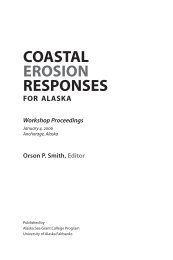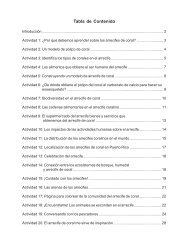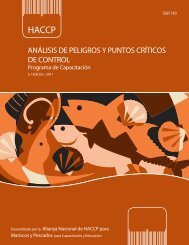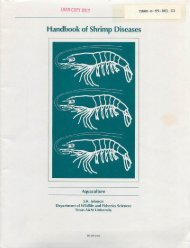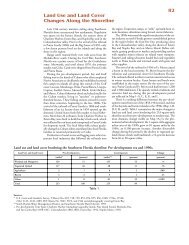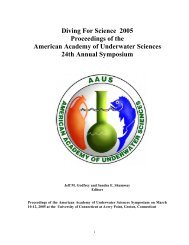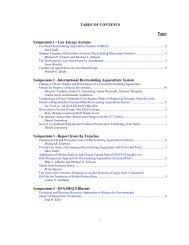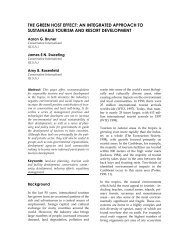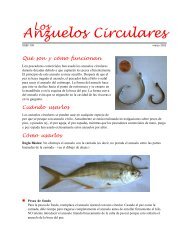4 °C - the National Sea Grant Library
4 °C - the National Sea Grant Library
4 °C - the National Sea Grant Library
You also want an ePaper? Increase the reach of your titles
YUMPU automatically turns print PDFs into web optimized ePapers that Google loves.
WHAT YOU SEE IS WHAT YOU GET<br />
Charles A. Payne, S.N. Payne<br />
Institute of Neurology - Metropolitan Hospital<br />
San Juan, Puerto Rico 00921<br />
Ciguatera affects multiple organ systems having impressive gastrointestinal, neuromuscular,<br />
cardiovascular, dermatological, genitourinary and emotional components. Onset of symptoms is usually<br />
between 15 minutes to 30 hours of fish ingestion, ushered in typically by gastrointestinal upset including<br />
hypersalivation, nausea, abdominal cramps, vomiting and watery diarrhea. Neuromuscular manifestations<br />
usually follow, including dyses<strong>the</strong>sias of <strong>the</strong> extremities, itching, ei<strong>the</strong>r generalized or of <strong>the</strong> palms and<br />
soles, or after alcohol, numbness,, prickling and burning sensations, and temperature reversal, where cold<br />
feels Iike hot. Headaches, vertigo, dizziness, circumoral tingling, metallic tasts, dry mouth, pain or tingling<br />
or a “loose” sensation of <strong>the</strong> teeth are often complained of. Cranial nerve palsies, aphonia, ptosis, or miosis<br />
may occur. Pain in <strong>the</strong> muscles and joints, low back pain, muscle stiffness or spasm or fasciculations are<br />
not uncommon. Carpopedal spasm, trismus, menigismus, opisthotonus, weakness, ataxia, muscular<br />
incorrdiantional and inability to stand have all been reported. Hyporeflexia, areflexia, stocking and glove<br />
hypes<strong>the</strong>sia or numbness, malaiseor profound fatigue, stupor, peripheral flaccid paralysis, respiratory failure,<br />
generalized seizures and rarely, death may occur. Cardiovascular manifestations include any combination<br />
of hypotension, bradycardia, hypertension, tachycardia, arrhythmias, heart block, pulmonary edema and<br />
congestive heart failure. Dermatologically, <strong>the</strong> patient may develop rash, ery<strong>the</strong>ma, sweating or loss of hair<br />
and nails. Genitourinary and signs include painful urination (dysuria), pain in <strong>the</strong> perineum, penis or vagina<br />
and pain in <strong>the</strong> penis during erection. This has been reported to be intensified during ejaculation and<br />
transmitted to <strong>the</strong> female partner causing painful intercourse (dyspareunia). The toxin can cross <strong>the</strong> placental<br />
barrier causing hypoactivity of <strong>the</strong> fetus by sonography and transient hypoactivity of <strong>the</strong> newborn. The toxin<br />
can also be secreted in <strong>the</strong> breast milk causing hypersensitivity of <strong>the</strong> nipples and interfere with<br />
breastfeeding. Emotionally, <strong>the</strong> patient may be depressed, hyperexcitable, anxious, nervous, giddy,<br />
apprehensive and restless, progressing to shouting. Hysteria, delirium, hallucinations and irrational behavior<br />
may been seen.<br />
After <strong>the</strong> acute phase has passed, many bo<strong>the</strong>rsome symptoms may linger on for months. This<br />
“chronic ciguatera” includes itching after alcohol, persistent dyses<strong>the</strong>sias, sensitivity to cold, loss of energy,<br />
fatigue, malaise, and depression, among o<strong>the</strong>rs. Chronic fatigue has also been linked to o<strong>the</strong>r toxic<br />
poiye<strong>the</strong>rs and ciguatera should be considered in <strong>the</strong> differential diagnosis. Two cases of biopsy proven<br />
polymyositis have been reported occurring several years after ciguatoxin exposure.<br />
The disease is vastly under-diagnosed and diagnosis is made almost entirely by history, and usually<br />
in retrospect. There are few physical findings, none of which are diagnostic. Re-exposure may cause<br />
significant worsening of symptoms. There are no formal criteria for diagnosis. A high index of suspicion<br />
is needed and one must have heard of <strong>the</strong> disease to consider <strong>the</strong> diagnosis. Any unusual combination if<br />
gastrointestinal, neuromuscular, cardiovascular, dermatological, genitourinary or emotional symptoms<br />
should arouse <strong>the</strong> clinical suspicion to inquire if fish had been ingested. The initial gastrointestinal phase<br />
be <strong>the</strong> only manifestation, or only neurological involvement may occur.Occasionally, only <strong>the</strong> inverted<br />
sensory phenomenon, or itching after alcohol are seen, with no o<strong>the</strong>r symptoms. The usual patient is quite<br />
uncomfortable.




